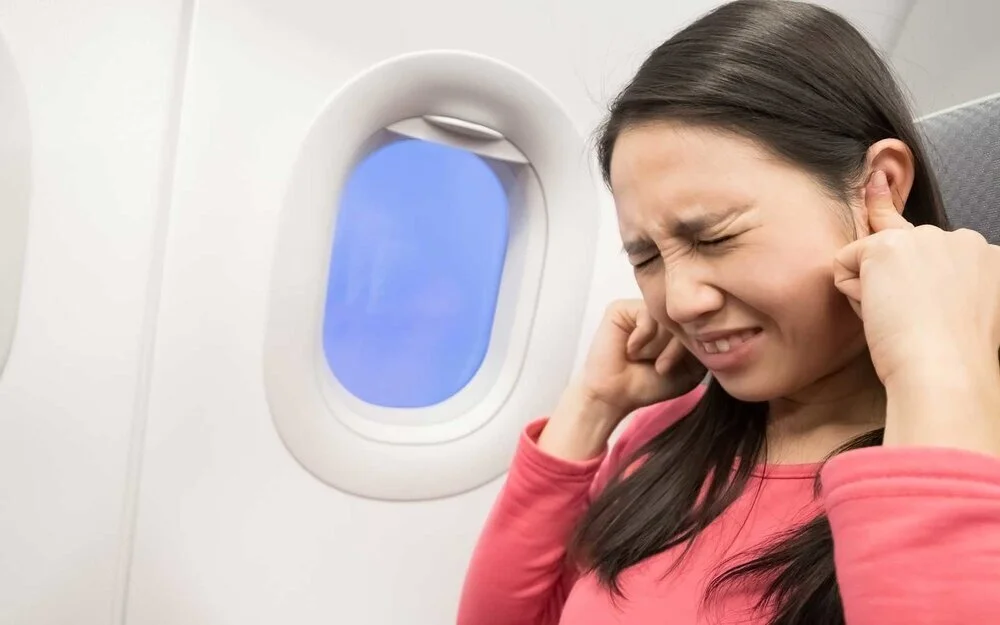Dangers of Airplane Travel And Blocked Ears
How To Protect Yourself
By Lisa Monroe
After a long 16 months or more, many of us are finally traveling again and boarding planes to great destinations! But for those of us who suffer from blocked ears, commonly known as “airplane ear” the experience can be unpleasant, painful and even dangerous.
We rely on clear, well-functioning ears to hear important information from the pilot and flight attendants, and of course for our overall quality of life. We want not only to have a safe and pain-free flying experience, but also to protect the health of our ears in the long run.
What is airplane ear?
If you have ever flown, you are probably all too familiar with that bothersome feeling you get in your ears at certain times during the flight. Especially when the plane is ascending after takeoff or descending when it is time to land. It can also be experienced at other times throughout the flight when there is a sudden change in altitude or air pressure. And the feeling can range from unpleasant to severe ear pain, often including severe sinus pain.
As air pressure and altitude change, the sinus pressure and pressure in our ears will feel the impact because our eustachian tubes can’t adjust quickly enough. This imbalance in pressures potentially causes blocked ears, ruptured or perforated eardrums, hearing loss or worse!
Symptoms
Some of the common symptoms you may be experiencing during air travel and the associated altitude and air pressure changes are:
• Pain or discomfort in your ears
• Ears feeling full, blocked or stuffed
• Muffled or decreased hearing
Severe Symptoms
Some of the more painful and potentially dangerous symptoms to look out for are:
• Severe pain or pressure in your ears
• Moderate or severe loss of hearing
• Ringing in your ears
• Vertigo (dizziness)
• Bleeding from your ears
Risk Factors
Sometimes you may feel a bit under the weather prior to traveling, but don’t want to cancel that long awaited trip simply because of a common cold or an allergy. This can cause you to be more susceptible or sensitive to symptoms. You are at increased risk of airplane ear and the associated complications if you have one or more of the following conditions:
• A cold
• A sinus infection
• Hay fever
• An ear infection
• Narrow eustachian tubes
• Tendency to sleep on the plane (being unable to voluntarily yawn or swallow)
Long-term complications though rare can occur, including permanent hearing loss or ongoing tinnitus (ear ringing).
Prevention
There are of course the old school solutions that have been around forever. The reality is they may not work for everyone. And if they have worked in the past, it may not have been on a consistent basis. You have likely tried some of them…yawning, pinching your nose shut, chewing gum, etc.
The truth is, being proactive may bring much better results! As with many issues the key is identifying the underlying source of the problem rather than treating your symptoms after the fact. If your ears, nose and sinus passages are not clear to begin with, you are likely to feel greater discomfort when in flight.
If you prefer a natural alternative that appears to have a very high success rate, consider an effective product called Pressureze® Nasal Mist to clear your sinuses, ears and nose prior to boarding the plane. This is a great preventative measure, that can eliminate the pain caused by fluctuating altitudes which lead to “airplane ears”.
Travel allows us to see the world and have so many great experiences. But for some, flying can bring great physical pain and distress, causing them to avoid it altogether out of fear of doing permanent damage to their ears.
This doesn’t have to be the case. Pressureze® is a great way to naturally and effectively, open your sinuses and ear canals, so you can once again fly safely and comfortably!


